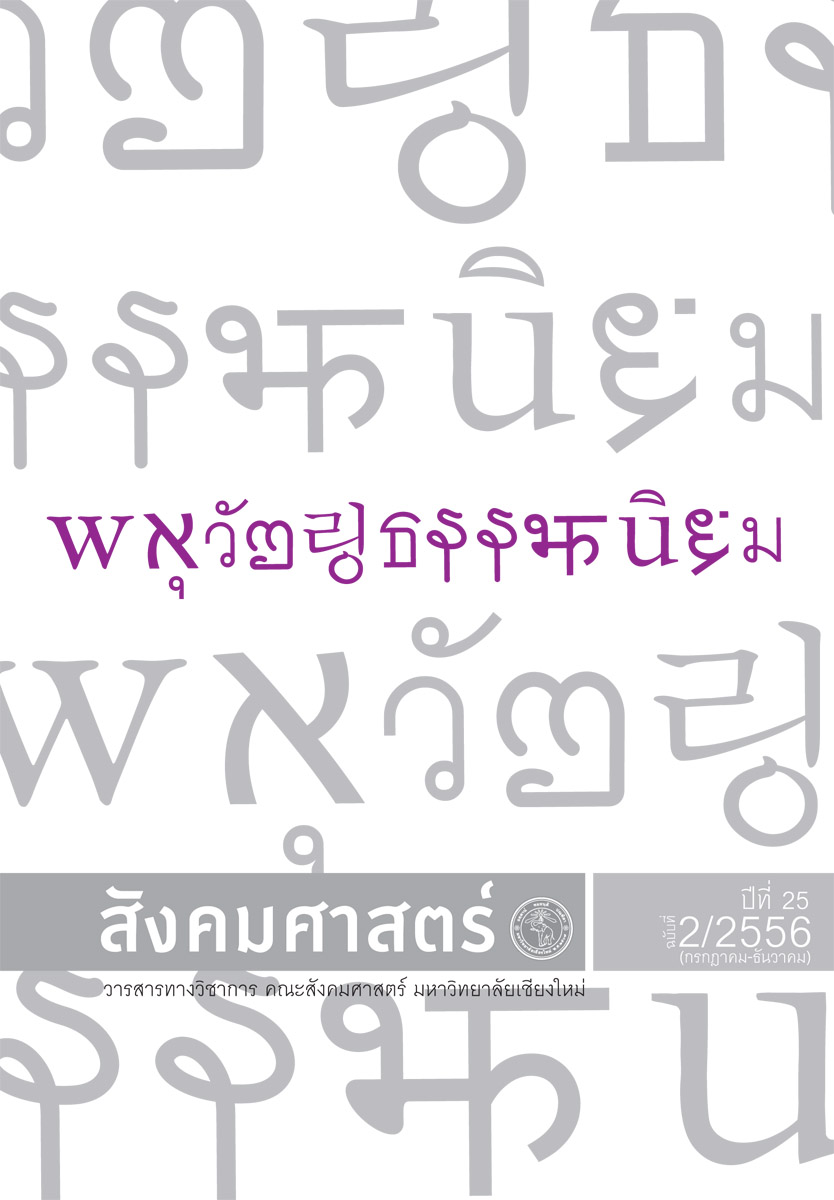The Politics on Languages in Thai Society
Main Article Content
Abstract
Language is a part of culture and wisdom of all human being. It takes time to create and transfer from generation to generation. Language is not only tool of communication of people in society and ethnic marker but it is also a technology of power for construction the body of nation state by the construction of national language. While power of national language has increased, at the same time other languages in the nation state is excluded and oppressed. Thailand as a multilingual society, its history and culture have shown the prosperous diversity of linguistic and ethnicity community. It comprises of the Thai and non-Thai speaking communities such as the ethnic minorities languages in the highland communities in the north, the Lao and Khmer speakers in the northeast, Mon speakers in the west and the Thai-Malay speaking communities in the south. The state practices through the education system, politics, socio-economic development intend to construct the power of national language by a monolingual policy, since the modern nation-state had been built up to the present. However, there are several movements of minority language communities in responding to and negotiating with the monolingual policy and technology of power of the state. This is not only the linguistic revitalization and preservation but also the construction of their social space. This article attempts to understand and analyze the politics of languages in Thailand under the implementation of monolingual policy that causes the confrontation and negotiation of the ethno-linguistic communities for their social space construction.
Article Details
All written articles published on Journal of Social Sciences is its author’s opinion which is not belonged to Faculty of Social Sciences, Chiang Mai University or is not in a responsibility of the journal’s editorial committee’s members.
References
ชัยมงคล เฉลิมสุขจิตศรี. 2551. “การศึกษาในภาษาดั้งเดิมในมุมมองของประเด็น
สิทธิมนุษยชน: กรณีศึกษาภาษาเขมรของชนชาติดั้งเดิมเขมรในจังหวัดสุรินทร์
ประเทศไทย” ใน บทความนำเสนอในการประชุมวิชาการ ชาตินิยมกับ
พหุวัฒนธรรม ณ ศูนย์ประชุมนานาชาติ โรงแรมดิเอ็มเพรส เชียงใหม่, 22-23
ธันวาคม 2551: 143-149.
ชาญวิทย์ เกษตรศิริ (บก. แปล). 2552. ชุมชนจินตกรรม: บทสะท้อนว่าด้วยกำเนิดและการแพร่ขยายของชาตินิยม แปลจาก เบน แอนเดอร์สัน. Imagined
Communities: Reflections on the Origin and Spread of Nationalism.
กรุงเทพฯ: มูลนิธิโครงการตำราสังคมศาสตร์และมนุษยศาสตร์.
ประสิทธิ์ ลีปรีชา. 2550. “ระบบการศึกษาและภาษาในกระบวนการสร้างรัฐชาติไทย”สังคมศาสตร์ 19(1): 277-309.
ม.ป.ช. 2556. ห้องเรียนสองวัฒนธรรม: บ้านมอวาคี พื้นที่เขตวัฒนธรรมพิเศษ.
เชียงใหม่: ศูนยศึกษาชาติพันธุ์และการพัฒนา คณะสังคมศาสตร์ มหาวิทยาลัย
เชียงใหม่.
มูลนิธิชนเผ่าพื้นเมืองเพื่อการศึกษาและสิ่งแวดล้อม (มกส.) และสมาคมศูนย์รวม
การศึกษาและวัฒนธรรมของชาวไทยภูเขาในประเทศไทย. 2556. ปฏิญญา
สหประชาชาติว่าด้วยสิทธิชนเผ่าพื้นเมือง. เชียงใหม่: สำนักพิมพ์เอไอพีพี.
ยุกติ มุกดาวิจิตร. 2551. “สังคมพหุภาษาในยุคที่ไร้ถิ่นฐาน: นโยบายและปฏิบัติการจากมุมมองข้ามวัฒนธรรม” บทความนำเสนอในการประชุมวิชาการ ชาตินิยมกับพหุวัฒนธรรม ณ ศูนย์ประชุมนานาชาติ โรงแรมดิเอ็มเพรส เชียงใหม่, 22-23
ธันวาคม 2551. หน้า 181-194.
สายชล สัตยานุรักษ์. 2551. “ชาตินิยม วัฒนธรรม และความขัดแย้ง” ใน บทความ
แนวคิด การประชมว ุ ชาการ ิ ชาตินิยมกับพหุวัฒนธรรม, หน้า 99-214. เชียงใหม่ :ศูนย์ภูมิภาคด้านสังคมศาสตร์เพื่อการพัฒนาอย่างยั่งยืน คณะสังคมศาสตร์
มหาวิทยาลัยเชียงใหม่.
สุวิไล เปรมศรีรัตน์ และคณะ. 2545. “แผนที่ภาษาของกลุ่มชาติพันธุ์ต่างๆ ในประเทศไทย”. วารสารภาษาและวัฒนธรรม 21(1): 5-35.
________. 2547. แผนที่ภาษาของกลุ่มชาติพันธุ์ต่างๆ ในประเทศไทย. กรุงเทพฯ:สำนักงานคณะกรรมการวัฒนธรรมแห่งชาติ.
สุวิไล เปรมศรีรัตน์. 2551. “นโยบายทางภาษาสำหรับกลุ่มชาติพันธุ์”, บทความ
นำเสนอในการประชุมวิชาการ ชาตินิยมกับพหุวัฒนธรรม ณ ศูนย์ประชุม
นานาชาติ โรงแรมดิเอ็มเพรส เชียงใหม่ 22-23 ธันวาคม 2551. หน้า 41-53.
เสกสรรค์ ประเสริฐกุล. 2551. “รัฐชาติ ชาติพันธุ์ และความทันสมัย” ใน บทความ
แนวคิด การประชุมวิชาการ ชาตินิยมกับพหุวัฒนธรรมหน้า, หน้า 99-214.
เชียงใหม่: ศูนย์ภูมิภาคด้านสังคมศาสตร์เพื่อการพัฒนาอย่างยั่งยืน
คณะสังคมศาสตร์ มหาวิทยาลัยเชียงใหม่.
ภาษาอังกฤษ
Anderson, Benedict R. O’G. 1991. Imagined Communities: Reflections on theOrigin and Spread of Nationalism. London: Verso.
Diller, Anthony. 1991. “What Makes Central Thai a National Language?” in Craig J. Reynolds (ed.), National Identity and Its Defenders: Thailand,
1939-1989, pp. 87-131. Chiang Mai: Silkworm Books.
Keys, Charles F. 2003. “The Politics of Language in Thailand and Laos” in Michael E. Brown and Sumit Ganguly (eds.), Fighting Worlds: Language Policy and Ethnic Relations in Asia, pp. 177-210. Cambridge, MA: The
MIT Press.
Simmee Oupra. 2009. Language Ecology and Language Planning in Chiang Rai Province, Thailand. Thesis Submitted for the Degree of Doctor of Philosophy in Linguistics, Department of Linguistics, Faculty of Humanities and Social Sciences, University of Adelaide, Australia.
Panadda Boonyasaranai. 2010. The Development and Use of Common Akha Orthography Development. Ph.D. Dissertation in Linguistics, Mahidol University.
Pine, Judith M.S. 2002. Lahu Writing and Writing Lahu: An Inquiry into the Value of Literacy. Thesis Submitted for the Degree of Doctor of Philosophy in Anthropology, Department of Anthropology, University of Washington.
Smalley, William Allen, Chia Koua Vang, Gnia Yee Yang. 1990. Mother of Writing: The Origin and Development of a Hmong Messianic Script. Project translator by Mitt Moua, The University of Chicago Press.
Yukti Mukdawijitra. 2007. Ethnicity and Multilingualism: The Case of Ethnic Tai in the Vietnamese State. Ph.D. Dissertation in Anthropology, University of Wisconsin-Madison.


